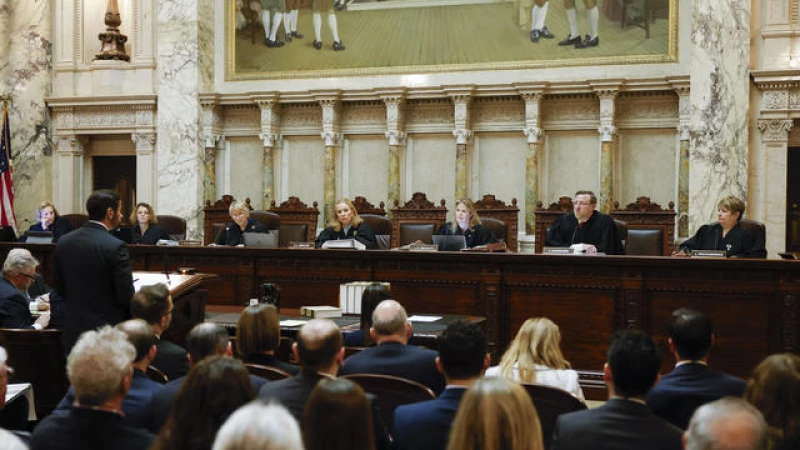Wisconsin Supreme Court Orders Redrawing of Legislative Maps
The Wisconsin Supreme Court, currently dominated by liberal justices, has overturned the Republican-drawn legislative maps. In a 4-3 ruling, the court sided with Democrats in a redistricting case aimed at weakening GOP majorities in the state.
This decision comes just ahead of the 2024 election, and Wisconsin being a battleground state where past presidential elections have been decided by slim margins. The Republican Party has held significant legislative majorities due to the maps they drew over a decade ago.
The court's majority agreed with the Democrats' argument that the current legislative maps are unconstitutional because the districts are not contiguous. They also contended that the Supreme Court violated the separation of powers doctrine.
The lawsuit challenging the maps was filed shortly after Justice Janet Protasiewicz, a liberal, joined the court following her successful election victory in April. During her campaign, Protasiewicz criticized the GOP-drawn maps as "unfair" and "rigged." This led to Republicans threatening to impeach her even before she had the opportunity to hear a case. In the end, Protasiewicz aligned with the other liberal justices in striking down the existing maps.
Republican Assembly Speaker Robin Vos Backs Off Impeachment Threat
Republican Assembly Speaker Robin Vos, who had previously threatened impeachment, announced on Wednesday that impeachment was now "super unlikely" even if the court ruled in favor of throwing out the legislative maps. This statement comes after the Wisconsin Supreme Court heard oral arguments in the case last month. The state elections commission has set a deadline of March 15 for the new maps to be in place for the 2024 election.
The dispute arises from Democrats' request to have all 132 lawmakers stand for election under the new maps, including those who are midway through their four-year terms. On the other hand, the Legislature argues that no new maps should be enacted until the 2026 election. Democrats claim that a majority of the current legislative districts in Wisconsin violate the state constitution's contiguity requirement, with 54 out of 99 Assembly districts and 21 out of 33 Senate districts being noncontiguous.
Wisconsin's Redistricting Laws Under Scrutiny
Attorneys for the Legislature argue that Wisconsin's redistricting laws, supported by state and federal court rulings over the past 50 years, allow for noncontiguous districts under certain circumstances. They further assert that even if the court decides to address the issue, it can only affect alleged areas where districts are not contiguous and cannot disrupt existing district lines. Republicans maintain that the current district lines should remain intact.
Democrats have raised concerns about the state Supreme Court's adoption of the Republican-drawn map in Wisconsin. They argue that this violates the separation of powers doctrine and allows the court to take powers that should belong to other branches of government.
The Republican-controlled Legislature drew the legislative electoral maps in 2011, which solidified the party's majorities in the Assembly and Senate. Currently, Republicans hold a 64-35 majority in the Assembly and a 22-11 supermajority in the Senate.
Since gaining the majority in 2011, Republicans have implemented a range of conservative policies. They have significantly curtailed collective bargaining for public workers and have obstructed Democratic Governor Tony Evers' agenda by firing his appointees and threatening impeachment.
Furthermore, Republicans are only two seats away from achieving a supermajority that would enable them to overturn Evers' vetoes.
Lawsuits are ongoing in multiple states regarding the redrawing of U.S. House and state legislative districts following the 2020 census.







